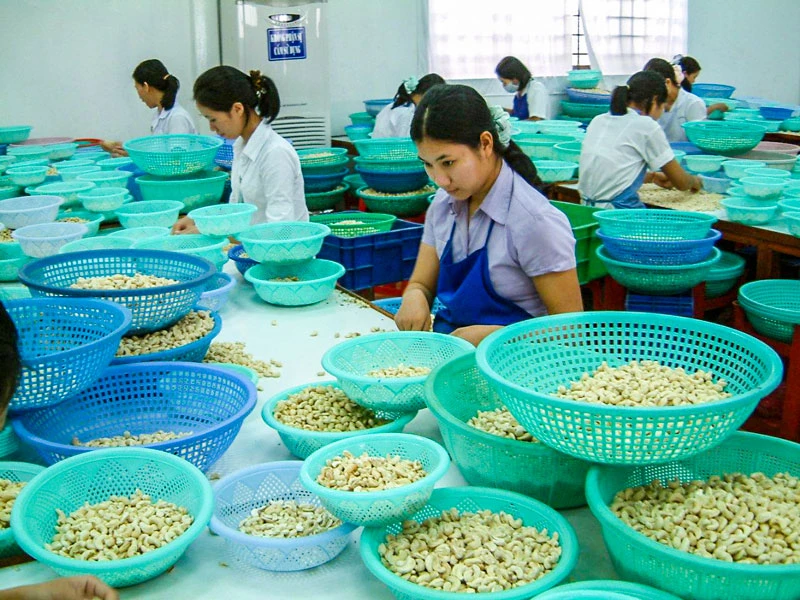
Now that the epidemic has spread to many more countries such as Japan, South Korea, Europe, and the US, the difficulties that all businesses will have to cope with have become much more complex and worrisome.
Exports under stress
Vietnam is one of the biggest cashew exporting countries in the world, supplying major markets in Europe, the US and China. Therefore, when the Covid-19 epidemic broke out in China, the cashew industry was directly affected.
According to Mr. Pham Van Cong, Chairman of the Vietnam Cashew Association, China consumes large quantities of cashews and almonds. Due to the Covid-19 epidemic, import of almonds has plummeted, and almond prices have fallen drastically. This also affected cashew exports to China. Now that the epidemic is more widespread, the impact will be even greater on the entire cashew export industry in Vietnam.
The seafood industry has also suffered from the spread of the Covid-19 epidemic. There are no specific assessments, but according to the Vietnam Association of Seafood Exporters and Producers (VASEP), some seafood export contracts to South Korea are stagnating. Mr. Truong Dinh Hoe, General Secretary of VASEP, said that the seafood industry usually produces as per order from each country or each importer, so when imports are suspended we must stop production, but we also cannot transfer that product to another market.
When Covid-19 epidemic broke out in China, many enterprises were still not too worried, but now that South Korea, Europe and the US are also affected with the epidemic, the situation has become extremely worrisome. While tackling with the ongoing spread of the epidemic there are also post-concerns, because when the epidemic is controlled, countries that compete in seafood products with Vietnam such as India, Thailand and Indonesia will boost their exports and the price competition will become more intense.
With processing of products facing extreme stress and difficulties, fresh export products such as fruits are facing a crisis situation. Mr. Vo Quang Huy, Director of Huy Long An Co. Ltd., a company specializing in export of bananas, said that orders to China have not been many and now the company is worried because Japan, which is the main export market for the Huy Long An Company, is reeling under the Covid-19 epidemic.
If orders become stagnant, it is difficult for cold fruits to be transferred to the export market because of many factors such as technical requirements and export regulations. Domestic consumption of high-standards of export products is also limited, so it is not easy for businesses to turn around.
Businesses hope epidemic ends soon
Businesses never use the word “hope” in making any business plan for their companies, especially export enterprises who have to deal very seriously with realistic situations on the ground. Yet the word “hope” has now penetrated the dictionary of most businesses who “hope” that the epidemic passes soon, because if the epidemic spreads even further and for a longer duration, the impact will be very serious and global demand will drop sharply.
In particular, industries that depend on import of raw materials and components from countries such as China, Japan, and South Korea will feel the stress the most. Last week, at a meeting to assess the impact of the Covid-19 epidemic on manufacturing industries in the country, the Ministry of Industry and Trade pointed out the risks to many businesses that will stop operating due to shortage of raw materials.
For most electronic enterprises, there are only enough electronic components for production till the middle or end of March. In 2019, Vietnam imported about USD 40 bn of electronic components from South Korea and China, amounting to 42% and 34%, respectively.
The textile industry too will face a severe shortage of raw materials. According to Mr. Pham Xuan Hong, Chairman of the Ho Chi Minh City Association of Garments, Textiles, Embroidery and Knitting (AGTEK), most enterprises only have enough raw material for production until the end of March. Hence if there is no input then output cannot be assured, and many businesses will face the double risk of reduced demand as well as a sharp drop in export price.
-Mr. Truong Thanh Hoai, Director of Department of Industries, Ministry of Industry and Trade.
Solutions to support businesses were also discussed in the meeting of the Ministry of Industry and Trade, where policies to extend the repayment period of short-term loans for production and business activities of enterprises were discussed.
Also on the agenda were policies on tax exemption; reduction and early VAT refund; allowing late payment of tax or not imposing penalties for late payment of tax for businesses that have not paid taxes due to the epidemic; support for enterprises to pay social insurance premiums for laborers in case of suspended production due to the epidemic; consider refunding of security deposit to ensure implementation of projects or those not yet in operation due to the epidemic.
These support measures must be implemented soon, and we should not let enterprises weaken before we have to rush to support them afterwards.
In this difficult scenario, many export enterprises or other businesses will still find opportunities to do business. Talking with Saigon Investment, Mr. Le Duy Toan, Director of Duy Anh Food Company, said that their company was receiving orders from foreign partners for their brand of vermicelli, dry noodles and rice paper.
Such ready to eat and dry processed foods are proving to be convenient foods during the current epidemic, and the Duy Anh Food Company expects to increase their exports far more than in previous years. In particular, the South Korean market used to be very stringent in conducting food quality checks, but now the regulations have become much more simpler.




















